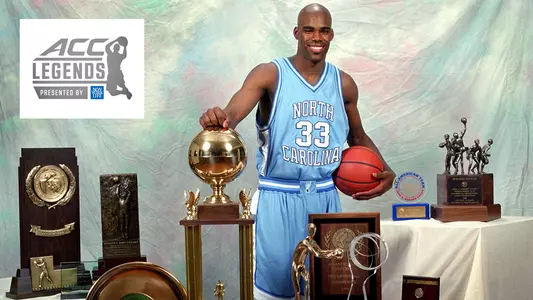Antawn Jamison’s name still echoes loudly in Chapel Hill, nearly three decades after he last wore the Carolina blue. For many North Carolina fans, Jamison embodies the perfect blend of dominance, humility, and loyalty that defines the Tar Heel basketball tradition. While his college career ended in 1998, his impact remains timeless, sparking debates about where he belongs among UNC’s all-time greats.
Jamison’s three-year career at North Carolina was nothing short of historic. He averaged a double-double his sophomore and junior seasons, and his lightning-quick release around the rim made him nearly unstoppable. By the time he declared for the NBA Draft in 1998, he had racked up 1,974 points and 1,027 rebounds — putting him in rarefied air in Tar Heel history.
What made Jamison special wasn’t just the stats; it was the way he dominated games without needing the spotlight. Dean Smith once marveled at Jamison’s efficiency, noting how he could score 20 points on fewer than a dozen shots. Fans at the Smith Center will never forget his signature “flick” finish in the paint, a move that seemed impossible to defend.
The 1998 season stands as Jamison’s crowning jewel. That year, he won the Naismith College Player of the Year, the Wooden Award, and the ACC Player of the Year — a sweep that only a handful of Tar Heels have ever achieved. His performance carried UNC to the Final Four, where the Heels fell just short of another national championship. For some fans, that near-miss still stings; for others, it only adds to the “what if” of Jamison’s legacy.
Many argue Jamison belongs on the Mount Rushmore of Tar Heels alongside Michael Jordan, James Worthy, Phil Ford, and Tyler Hansbrough. His college dominance and individual accolades give him a strong case. But detractors point to UNC’s lack of a national title during his time as the reason he’s sometimes left off “greatest Tar Heels” lists. That tension keeps his legacy alive in fan debates to this day.
Off the court, Jamison was just as beloved. Teammates praised his leadership and quiet determination. Fans admired his decision to stay three full seasons at Chapel Hill when he easily could have bolted for the NBA after his sophomore year. In an era when stars were leaving earlier and earlier, Jamison’s commitment felt like a love letter to Tar Heel Nation.
His jersey retirement in 2000 was a moment of pure pride for UNC. When his No. 33 was lifted to the rafters at the Dean Dome, fans roared as if he had just hit a game-winning shot. To this day, seeing that number in the rafters is a reminder of how Jamison cemented himself among Carolina royalty.
In the NBA, Jamison carved out a 16-year career, scoring over 20,000 points and earning two All-Star selections. Yet for many Carolina fans, his professional success was just an extension of the brilliance they saw on campus. He never won an NBA title, but his consistency and longevity added to the respect his name carries.
Now, as fans reflect on the modern era of UNC basketball, Jamison’s story takes on even greater meaning. In a time when college stars rarely stay long enough to leave such an imprint, Jamison stands out as one of the last great examples of a player who gave everything to his school before moving on. That’s why his legacy sparks such passionate reactions — he represents a version of college basketball fans fear is fading away.
For younger fans, Jamison’s name might not resonate as strongly as Jordan or Hansbrough. But ask anyone who watched UNC in the late 1990s, and they’ll tell you Jamison was the guy who defined Tar Heel basketball. His ability to dominate games with grace and efficiency left an indelible mark on the program.
Antawn Jamison’s legacy at North Carolina will forever be one of brilliance, loyalty, and unfinished business. He gave Tar Heel Nation unforgettable memories, and even without a national championship ring, his place in UNC history is secure. For fans, the debates will continue — but one thing is clear: Antawn Jamison is a Tar Heel legend through and through.






















